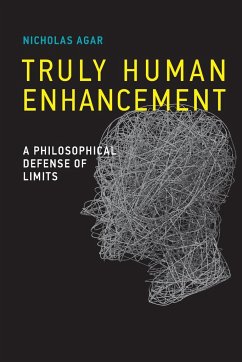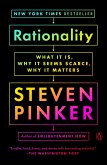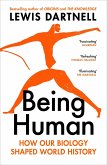- Broschiertes Buch
- Merkliste
- Auf die Merkliste
- Bewerten Bewerten
- Teilen
- Produkt teilen
- Produkterinnerung
- Produkterinnerung
A nuanced discussion of human enhancement that argues for enhancement that does not significantly exceed what is currently possible for human beings.
Andere Kunden interessierten sich auch für
![On the Genealogy of Morals (Collector's Edition) (Laminated Hardback with Jacket) On the Genealogy of Morals (Collector's Edition) (Laminated Hardback with Jacket)]() Friedrich NietzscheOn the Genealogy of Morals (Collector's Edition) (Laminated Hardback with Jacket)44,99 €
Friedrich NietzscheOn the Genealogy of Morals (Collector's Edition) (Laminated Hardback with Jacket)44,99 €![On the Genealogy of Morals On the Genealogy of Morals]() Friedrich NietzscheOn the Genealogy of Morals11,99 €
Friedrich NietzscheOn the Genealogy of Morals11,99 €![Rationality Rationality]() Steven PinkerRationality15,99 €
Steven PinkerRationality15,99 €![On the Aesthetic Education of Man On the Aesthetic Education of Man]() Friedrich SchillerOn the Aesthetic Education of Man12,99 €
Friedrich SchillerOn the Aesthetic Education of Man12,99 €![Moral Tribes Moral Tribes]() Joshua GreeneMoral Tribes12,99 €
Joshua GreeneMoral Tribes12,99 €![Being Human Being Human]() Lewis DartnellBeing Human9,99 €
Lewis DartnellBeing Human9,99 €![The Right To Be Lazy The Right To Be Lazy]() Paul LafargueThe Right To Be Lazy16,99 €
Paul LafargueThe Right To Be Lazy16,99 €-
-
-
A nuanced discussion of human enhancement that argues for enhancement that does not significantly exceed what is currently possible for human beings.
Hinweis: Dieser Artikel kann nur an eine deutsche Lieferadresse ausgeliefert werden.
Hinweis: Dieser Artikel kann nur an eine deutsche Lieferadresse ausgeliefert werden.
Produktdetails
- Produktdetails
- Verlag: MIT Press
- Seitenzahl: 234
- Erscheinungstermin: 19. September 2023
- Englisch
- Abmessung: 229mm x 152mm x 15mm
- Gewicht: 387g
- ISBN-13: 9780262549202
- ISBN-10: 0262549204
- Artikelnr.: 69013051
- Herstellerkennzeichnung
- Libri GmbH
- Europaallee 1
- 36244 Bad Hersfeld
- gpsr@libri.de
- Verlag: MIT Press
- Seitenzahl: 234
- Erscheinungstermin: 19. September 2023
- Englisch
- Abmessung: 229mm x 152mm x 15mm
- Gewicht: 387g
- ISBN-13: 9780262549202
- ISBN-10: 0262549204
- Artikelnr.: 69013051
- Herstellerkennzeichnung
- Libri GmbH
- Europaallee 1
- 36244 Bad Hersfeld
- gpsr@libri.de
Nicholas Agar
Series Foreword ix
Preface xi
Acknowledgments xv
1 Radical Human Enhancement as a Transformative Change 1
Transformative Change and Invasion of the Body Snatchers 5
The Rational Irreversibility of Some Transformative Changes 10
Positive and Negative Transformative Changes 14
Radical Enhancement as a Negative Transformative Change 15
2 Two Ideals of Human Enhancement 17
Defining Human Enhancement 18
The Objective Ideal of Human Enhancement 20
The Instrumental and Intrinsic Value of Human Capacities 26
Anthropocentric Ways of Evaluating Enhancements 27
3 What Interest Do We Have in Superhuman Feats? 33
The Value of Enhanced Marathons 34
Simulation and Meaning 36
Is Human Enhancement the Right Way to Pursue External Goods? 44
Is the Distinction between Internalizing and Externalizing Enhancement
Philosophically Principled? 50
4 The Threat to Human Identities from Too Much Enhancement 55
Two Psychological Accounts of Personal Identity 56
A Threat to Identity from Life Extension 57
Radical Enhancement and Autobiographical Memory 60
How Does Autobiographical Memory Work? 62
An Asymmetry in Our Attitudes toward Past and Future 66
The Tension between Enhancement and Survival 69
The Analogy with Childhood 70
Why Radical Enhancement Is More Psychologically Disruptive Than Growing Up
75
The Regress Problem: The Tragedy of Unending Enhancement 76
5 Should We Enhance Our Cognitive Powers to Better Understand the Universe
and Our Place in It? 81
Understanding the Consequences of Cognitive Enhancement for Science 84
Two Ways in Which Human Science and Radically Enhanced Science Might Be
Fundamentally Different 88
Differences in Idealization as Fundamental Differences between Human and
Radically Enhanced Science 89
Idealizations That Enhance the Power of Scientific Explanations 93
Mathematics as a Bridge between Human and Radically Enhanced Science 95
Human Science, Radically Enhanced Science, and the Theory of Everything 97
Dawkins and Haldane versus Deutsch on the Limits of Human Science 98
How Different Idealizations Generate Different Theories of Everything 102
Valuing Human Science and Radically Enhanced Science 105
Radical Enhancement Reduces the Intrinsic Value of Our Cognitive Faculties
106
What of Scientific Enhancement’s Instrumental Benefits? 109
6 The Moral Case against Radical Life Extension 113
Two Kinds of Anti-Aging Research 114
The SENS Response to the Seven Deadly Things 117
Is Aging Really a Disease? 120
The Testing Problem 122
Why WILT (and Other SENS Therapies) Will Require Dangerous Human Trials 126
Where to Find Human Guinea Pigs for SENS 129
Will Volunteer Risk Pioneers Help Out? 131
Ethical Anti-Aging Experiments Not Now, but Some Day? 135
7 A Defense of Truly Human Enhancement 137
The Ubiquity of Human Enhancement 139
Enhancement and Heredity 142
Defining Genetic Enhancement 143
The Interactionist View of Development 144
Six Ways in Which Genetic Enhancements Could Turn Out to Be More Morally
Problematic Than Environmental Enhancements (but, in Fact, Do Not) 146
The Ideal of Truly Human Enhancement 154
8 Why Radical Cognitive Enhancement Will (Probably) Enhance Moral Status
157
Enhancing Moral Status versus Enhancing Moral Dispositions 158
Why It’s So Difficult to Enhance the Moral Status of Persons 159
A Justification for (Talking about) Moral Statuses 160
Three Obstacles to Moral Enhancement 161
(1) The Problem of the Logic of Thresholds 161
(2) The Problem of How to Improve upon Inviolability 163
(3) The Problem of Expressing Moral Statuses Higher Than Personhood 164
Three Attempts to Describe Higher Moral Statuses 165
DeGrazia’s Dispositionally Superior Post-Persons 167
McMahan’s Freer, More Conscious Post-Persons 169
Douglas’s Enhanced Cooperators 173
Criteria for Higher Moral Statuses and the Expressibility Problem 174
Why Cognitively Enhanced Beings Are Probably Better Than Us at Judging
Relative Moral Status 176
Why Sufficiently Cognitively Enhanced Beings Will (Probably) Find That
Cognitive Differences between Them and Us Mark a Difference in Moral Status
177
Two Hypotheses about Higher Moral Statuses 178
9 Why Moral Status Enhancement Is a Morally Bad Thing 181
Some Assumptions 182
Why a Change in Relative Moral Status Is Likely to Lead to Significant
Harms for Human Mere Persons 184
Why Post-Persons Will Probably Identify Many Supreme Opportunities
Requiring the Sacrifice of Mere Persons 189
What Complaint Can Mere Persons Make about the Harms They Suffer in Mixed
Societies? 190
Why a Loss of Relative Status Is Unlikely to Be Adequately Compensated 193
10 A Technological Yet Truly Human Future—as Depicted in Star Trek 195
Notes 201
Index 213
Preface xi
Acknowledgments xv
1 Radical Human Enhancement as a Transformative Change 1
Transformative Change and Invasion of the Body Snatchers 5
The Rational Irreversibility of Some Transformative Changes 10
Positive and Negative Transformative Changes 14
Radical Enhancement as a Negative Transformative Change 15
2 Two Ideals of Human Enhancement 17
Defining Human Enhancement 18
The Objective Ideal of Human Enhancement 20
The Instrumental and Intrinsic Value of Human Capacities 26
Anthropocentric Ways of Evaluating Enhancements 27
3 What Interest Do We Have in Superhuman Feats? 33
The Value of Enhanced Marathons 34
Simulation and Meaning 36
Is Human Enhancement the Right Way to Pursue External Goods? 44
Is the Distinction between Internalizing and Externalizing Enhancement
Philosophically Principled? 50
4 The Threat to Human Identities from Too Much Enhancement 55
Two Psychological Accounts of Personal Identity 56
A Threat to Identity from Life Extension 57
Radical Enhancement and Autobiographical Memory 60
How Does Autobiographical Memory Work? 62
An Asymmetry in Our Attitudes toward Past and Future 66
The Tension between Enhancement and Survival 69
The Analogy with Childhood 70
Why Radical Enhancement Is More Psychologically Disruptive Than Growing Up
75
The Regress Problem: The Tragedy of Unending Enhancement 76
5 Should We Enhance Our Cognitive Powers to Better Understand the Universe
and Our Place in It? 81
Understanding the Consequences of Cognitive Enhancement for Science 84
Two Ways in Which Human Science and Radically Enhanced Science Might Be
Fundamentally Different 88
Differences in Idealization as Fundamental Differences between Human and
Radically Enhanced Science 89
Idealizations That Enhance the Power of Scientific Explanations 93
Mathematics as a Bridge between Human and Radically Enhanced Science 95
Human Science, Radically Enhanced Science, and the Theory of Everything 97
Dawkins and Haldane versus Deutsch on the Limits of Human Science 98
How Different Idealizations Generate Different Theories of Everything 102
Valuing Human Science and Radically Enhanced Science 105
Radical Enhancement Reduces the Intrinsic Value of Our Cognitive Faculties
106
What of Scientific Enhancement’s Instrumental Benefits? 109
6 The Moral Case against Radical Life Extension 113
Two Kinds of Anti-Aging Research 114
The SENS Response to the Seven Deadly Things 117
Is Aging Really a Disease? 120
The Testing Problem 122
Why WILT (and Other SENS Therapies) Will Require Dangerous Human Trials 126
Where to Find Human Guinea Pigs for SENS 129
Will Volunteer Risk Pioneers Help Out? 131
Ethical Anti-Aging Experiments Not Now, but Some Day? 135
7 A Defense of Truly Human Enhancement 137
The Ubiquity of Human Enhancement 139
Enhancement and Heredity 142
Defining Genetic Enhancement 143
The Interactionist View of Development 144
Six Ways in Which Genetic Enhancements Could Turn Out to Be More Morally
Problematic Than Environmental Enhancements (but, in Fact, Do Not) 146
The Ideal of Truly Human Enhancement 154
8 Why Radical Cognitive Enhancement Will (Probably) Enhance Moral Status
157
Enhancing Moral Status versus Enhancing Moral Dispositions 158
Why It’s So Difficult to Enhance the Moral Status of Persons 159
A Justification for (Talking about) Moral Statuses 160
Three Obstacles to Moral Enhancement 161
(1) The Problem of the Logic of Thresholds 161
(2) The Problem of How to Improve upon Inviolability 163
(3) The Problem of Expressing Moral Statuses Higher Than Personhood 164
Three Attempts to Describe Higher Moral Statuses 165
DeGrazia’s Dispositionally Superior Post-Persons 167
McMahan’s Freer, More Conscious Post-Persons 169
Douglas’s Enhanced Cooperators 173
Criteria for Higher Moral Statuses and the Expressibility Problem 174
Why Cognitively Enhanced Beings Are Probably Better Than Us at Judging
Relative Moral Status 176
Why Sufficiently Cognitively Enhanced Beings Will (Probably) Find That
Cognitive Differences between Them and Us Mark a Difference in Moral Status
177
Two Hypotheses about Higher Moral Statuses 178
9 Why Moral Status Enhancement Is a Morally Bad Thing 181
Some Assumptions 182
Why a Change in Relative Moral Status Is Likely to Lead to Significant
Harms for Human Mere Persons 184
Why Post-Persons Will Probably Identify Many Supreme Opportunities
Requiring the Sacrifice of Mere Persons 189
What Complaint Can Mere Persons Make about the Harms They Suffer in Mixed
Societies? 190
Why a Loss of Relative Status Is Unlikely to Be Adequately Compensated 193
10 A Technological Yet Truly Human Future—as Depicted in Star Trek 195
Notes 201
Index 213
Series Foreword ix
Preface xi
Acknowledgments xv
1 Radical Human Enhancement as a Transformative Change 1
Transformative Change and Invasion of the Body Snatchers 5
The Rational Irreversibility of Some Transformative Changes 10
Positive and Negative Transformative Changes 14
Radical Enhancement as a Negative Transformative Change 15
2 Two Ideals of Human Enhancement 17
Defining Human Enhancement 18
The Objective Ideal of Human Enhancement 20
The Instrumental and Intrinsic Value of Human Capacities 26
Anthropocentric Ways of Evaluating Enhancements 27
3 What Interest Do We Have in Superhuman Feats? 33
The Value of Enhanced Marathons 34
Simulation and Meaning 36
Is Human Enhancement the Right Way to Pursue External Goods? 44
Is the Distinction between Internalizing and Externalizing Enhancement
Philosophically Principled? 50
4 The Threat to Human Identities from Too Much Enhancement 55
Two Psychological Accounts of Personal Identity 56
A Threat to Identity from Life Extension 57
Radical Enhancement and Autobiographical Memory 60
How Does Autobiographical Memory Work? 62
An Asymmetry in Our Attitudes toward Past and Future 66
The Tension between Enhancement and Survival 69
The Analogy with Childhood 70
Why Radical Enhancement Is More Psychologically Disruptive Than Growing Up
75
The Regress Problem: The Tragedy of Unending Enhancement 76
5 Should We Enhance Our Cognitive Powers to Better Understand the Universe
and Our Place in It? 81
Understanding the Consequences of Cognitive Enhancement for Science 84
Two Ways in Which Human Science and Radically Enhanced Science Might Be
Fundamentally Different 88
Differences in Idealization as Fundamental Differences between Human and
Radically Enhanced Science 89
Idealizations That Enhance the Power of Scientific Explanations 93
Mathematics as a Bridge between Human and Radically Enhanced Science 95
Human Science, Radically Enhanced Science, and the Theory of Everything 97
Dawkins and Haldane versus Deutsch on the Limits of Human Science 98
How Different Idealizations Generate Different Theories of Everything 102
Valuing Human Science and Radically Enhanced Science 105
Radical Enhancement Reduces the Intrinsic Value of Our Cognitive Faculties
106
What of Scientific Enhancement’s Instrumental Benefits? 109
6 The Moral Case against Radical Life Extension 113
Two Kinds of Anti-Aging Research 114
The SENS Response to the Seven Deadly Things 117
Is Aging Really a Disease? 120
The Testing Problem 122
Why WILT (and Other SENS Therapies) Will Require Dangerous Human Trials 126
Where to Find Human Guinea Pigs for SENS 129
Will Volunteer Risk Pioneers Help Out? 131
Ethical Anti-Aging Experiments Not Now, but Some Day? 135
7 A Defense of Truly Human Enhancement 137
The Ubiquity of Human Enhancement 139
Enhancement and Heredity 142
Defining Genetic Enhancement 143
The Interactionist View of Development 144
Six Ways in Which Genetic Enhancements Could Turn Out to Be More Morally
Problematic Than Environmental Enhancements (but, in Fact, Do Not) 146
The Ideal of Truly Human Enhancement 154
8 Why Radical Cognitive Enhancement Will (Probably) Enhance Moral Status
157
Enhancing Moral Status versus Enhancing Moral Dispositions 158
Why It’s So Difficult to Enhance the Moral Status of Persons 159
A Justification for (Talking about) Moral Statuses 160
Three Obstacles to Moral Enhancement 161
(1) The Problem of the Logic of Thresholds 161
(2) The Problem of How to Improve upon Inviolability 163
(3) The Problem of Expressing Moral Statuses Higher Than Personhood 164
Three Attempts to Describe Higher Moral Statuses 165
DeGrazia’s Dispositionally Superior Post-Persons 167
McMahan’s Freer, More Conscious Post-Persons 169
Douglas’s Enhanced Cooperators 173
Criteria for Higher Moral Statuses and the Expressibility Problem 174
Why Cognitively Enhanced Beings Are Probably Better Than Us at Judging
Relative Moral Status 176
Why Sufficiently Cognitively Enhanced Beings Will (Probably) Find That
Cognitive Differences between Them and Us Mark a Difference in Moral Status
177
Two Hypotheses about Higher Moral Statuses 178
9 Why Moral Status Enhancement Is a Morally Bad Thing 181
Some Assumptions 182
Why a Change in Relative Moral Status Is Likely to Lead to Significant
Harms for Human Mere Persons 184
Why Post-Persons Will Probably Identify Many Supreme Opportunities
Requiring the Sacrifice of Mere Persons 189
What Complaint Can Mere Persons Make about the Harms They Suffer in Mixed
Societies? 190
Why a Loss of Relative Status Is Unlikely to Be Adequately Compensated 193
10 A Technological Yet Truly Human Future—as Depicted in Star Trek 195
Notes 201
Index 213
Preface xi
Acknowledgments xv
1 Radical Human Enhancement as a Transformative Change 1
Transformative Change and Invasion of the Body Snatchers 5
The Rational Irreversibility of Some Transformative Changes 10
Positive and Negative Transformative Changes 14
Radical Enhancement as a Negative Transformative Change 15
2 Two Ideals of Human Enhancement 17
Defining Human Enhancement 18
The Objective Ideal of Human Enhancement 20
The Instrumental and Intrinsic Value of Human Capacities 26
Anthropocentric Ways of Evaluating Enhancements 27
3 What Interest Do We Have in Superhuman Feats? 33
The Value of Enhanced Marathons 34
Simulation and Meaning 36
Is Human Enhancement the Right Way to Pursue External Goods? 44
Is the Distinction between Internalizing and Externalizing Enhancement
Philosophically Principled? 50
4 The Threat to Human Identities from Too Much Enhancement 55
Two Psychological Accounts of Personal Identity 56
A Threat to Identity from Life Extension 57
Radical Enhancement and Autobiographical Memory 60
How Does Autobiographical Memory Work? 62
An Asymmetry in Our Attitudes toward Past and Future 66
The Tension between Enhancement and Survival 69
The Analogy with Childhood 70
Why Radical Enhancement Is More Psychologically Disruptive Than Growing Up
75
The Regress Problem: The Tragedy of Unending Enhancement 76
5 Should We Enhance Our Cognitive Powers to Better Understand the Universe
and Our Place in It? 81
Understanding the Consequences of Cognitive Enhancement for Science 84
Two Ways in Which Human Science and Radically Enhanced Science Might Be
Fundamentally Different 88
Differences in Idealization as Fundamental Differences between Human and
Radically Enhanced Science 89
Idealizations That Enhance the Power of Scientific Explanations 93
Mathematics as a Bridge between Human and Radically Enhanced Science 95
Human Science, Radically Enhanced Science, and the Theory of Everything 97
Dawkins and Haldane versus Deutsch on the Limits of Human Science 98
How Different Idealizations Generate Different Theories of Everything 102
Valuing Human Science and Radically Enhanced Science 105
Radical Enhancement Reduces the Intrinsic Value of Our Cognitive Faculties
106
What of Scientific Enhancement’s Instrumental Benefits? 109
6 The Moral Case against Radical Life Extension 113
Two Kinds of Anti-Aging Research 114
The SENS Response to the Seven Deadly Things 117
Is Aging Really a Disease? 120
The Testing Problem 122
Why WILT (and Other SENS Therapies) Will Require Dangerous Human Trials 126
Where to Find Human Guinea Pigs for SENS 129
Will Volunteer Risk Pioneers Help Out? 131
Ethical Anti-Aging Experiments Not Now, but Some Day? 135
7 A Defense of Truly Human Enhancement 137
The Ubiquity of Human Enhancement 139
Enhancement and Heredity 142
Defining Genetic Enhancement 143
The Interactionist View of Development 144
Six Ways in Which Genetic Enhancements Could Turn Out to Be More Morally
Problematic Than Environmental Enhancements (but, in Fact, Do Not) 146
The Ideal of Truly Human Enhancement 154
8 Why Radical Cognitive Enhancement Will (Probably) Enhance Moral Status
157
Enhancing Moral Status versus Enhancing Moral Dispositions 158
Why It’s So Difficult to Enhance the Moral Status of Persons 159
A Justification for (Talking about) Moral Statuses 160
Three Obstacles to Moral Enhancement 161
(1) The Problem of the Logic of Thresholds 161
(2) The Problem of How to Improve upon Inviolability 163
(3) The Problem of Expressing Moral Statuses Higher Than Personhood 164
Three Attempts to Describe Higher Moral Statuses 165
DeGrazia’s Dispositionally Superior Post-Persons 167
McMahan’s Freer, More Conscious Post-Persons 169
Douglas’s Enhanced Cooperators 173
Criteria for Higher Moral Statuses and the Expressibility Problem 174
Why Cognitively Enhanced Beings Are Probably Better Than Us at Judging
Relative Moral Status 176
Why Sufficiently Cognitively Enhanced Beings Will (Probably) Find That
Cognitive Differences between Them and Us Mark a Difference in Moral Status
177
Two Hypotheses about Higher Moral Statuses 178
9 Why Moral Status Enhancement Is a Morally Bad Thing 181
Some Assumptions 182
Why a Change in Relative Moral Status Is Likely to Lead to Significant
Harms for Human Mere Persons 184
Why Post-Persons Will Probably Identify Many Supreme Opportunities
Requiring the Sacrifice of Mere Persons 189
What Complaint Can Mere Persons Make about the Harms They Suffer in Mixed
Societies? 190
Why a Loss of Relative Status Is Unlikely to Be Adequately Compensated 193
10 A Technological Yet Truly Human Future—as Depicted in Star Trek 195
Notes 201
Index 213








